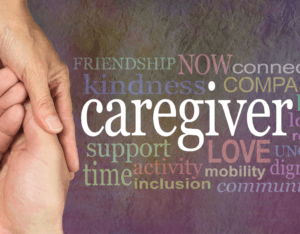How can I get paid being a family caregiver? If you’re one of the 34 million unpaid caregivers providing care and assistance for a family member, this article is for you.
As our population ages, more and more older adults are living and needing care longer. And, they want to stay in their own homes. Because of these changes, we’re starting to see some subtle changes in the attitudes and public policies about family caregiving.
First of all, Medicare does not pay family caregivers. However, Medicaid and the Department of Veterans Affairs are designing their own in-home care programs and hiring family members. Before you get your hopes up too high, the programs are still small and have a long way to go before they start having a major impact.
With that in mind, here are some ways that you, as a family caregiver, can be compensated.
Medicaid
If your loved one is eligible for Medicaid, check to see if your state has a participant-directed services program. These Medicaid programs are aimed at keeping people of all ages and disabilities independent and in their own homes. Programs go by different names and operate differently in each state, if your state has one.
Typically, the participant, working with a caseworker, draws up a care plan and hires a worker of choice, who can be a family member (though in many states not a spouse) to help with such activities as bathing, preparing meals or feeding.
Started as pilot projects called Cash & Counseling in the 1990s, consumer-directed programs expanded under the Affordable Care Act (aka Obama Care). Currently about 1 million people participate in self-directed Medicaid plans. The Centers for Medicare & Medicaid Services (CMS) provide financial incentives to states — as much as 6 percent of the cost — to offer the self-directed option.
California’s In-Home Supportive Services (IHSS) program, run by Medi-Cal (California’s Medicaid program) will pay friends, family members and in some instances, spouses, for help with housework, meal preparation and personal care.
Check with your local Area Agency on Aging for more information.
Veterans Benefits
The Department of Veterans Affairs has several programs that pay family caregivers under certain circumstances.
Veteran-Directed Home and Community Based Services gives veterans of all ages who otherwise would be in nursing homes the ability to tailor their long-term care at home, including hiring family members or friends as caregivers.
To qualify, a veteran must need assistance with at least three activities of daily living or have a significant cognitive impairment, and be enrolled in the VA for health care. There’s no income limit, but higher-income vets are subject to a copayment.
“The veteran is the employer and it’s up to the veteran how much they pay the care worker. Although the guideline is $20 an hour maximum. The veteran has a monthly budget based on physical condition that ranges from $1,200 to $4,000. The average is $2,000 a month. The vet doesn’t receive a check; the state or the aging office handles payments to the caregiver, employee taxes, and fees for counseling and financial management services.
The VA offers home caregivers of veterans who were severely injured or suffered mental health issues since 9/11 special benefits through Comprehensive Assistance for Family Caregivers, a congressionally mandated program. The caregiver may be a spouse, family member or friend.
A veteran who qualifies for the needs-based VA pension and has served one day in wartime may be eligible for Aid & Attendance benefits. Their surviving spouse may also qualify. The vet may pay a family member, though not a spouse, for help with activities of daily living, such as bathing, eating and dressing.
Housebound is a separate program that allows VA pension-eligible veterans who need help ambulating outside the home to pay a family caregiver. In both Aid & Attendance and Housebound, the caregiver must report the income to the IRS.
Your family member pays you
If your loved one can afford to pay you directly for home care, congratulations. You’re an employee, and you’ll need to pay federal, state and local taxes.
Just remember that if you’re paid under the table, you’re in violation of the law. It’s recommended that you don’t accept payment as a “gift” either. If someone makes a gift in return for services, it’s no longer a gift. It’s considered taxable income. You could consider getting employed by a home care agency and then working directly for them (providing care for your loved one). They will file the necessary paperwork, withhold taxes, etc.
Long-Term Care Insurance
If your loved one planned ahead and has long-term care insurance, some hybrid policies allow payments to family caregivers.
It may seem strange but, if you become a family caregiver paid by the family member, sign a contract. It should specify the services being performed and the payment amount.
The documentation will come in handy if the loved one later needs to qualify for Medicaid. Under the “look-back” provision, Medicaid will examine five years of records and could say the payments were a gift. If you’re continuing to pay someone and not reporting the payments as taxable income, each payment extends the five-year look-back period. And that could jeopardize your loved one from being qualified for Medicaid.
Recommended For You

COVID-19 and Caregivers
If you watch the news for even a minute these days you will undoubtedly be bombarded with information about COVID-19 (the coronavirus). I also know that the demands of caring …

Best Medical Alert Devices For Seniors
In this article, I will show you the top 5 best medical alert devices for seniors. Think of these devices as personal emergency response systems that stand by 24/7, ready to spring into action if there’s trouble. They allow seniors the opportunity to maintain their independence and ensure their safety.

How To Care For A Caregiver
If you are, or have been a caregiver, you know that caregiving is a labor of love. Your work is often performed in the shadows without much recognition. While caregivers …

Caregiver Job Description
Whether you are considering a job as a caregiver or looking to hire someone to care for a loved one, it is a good idea to have a caregiver job description in place. The job description will play a critical role in making sure that everyone is on the same

How to Stay Safe in the Bathroom – 9 Tips
The bathroom is the least safest room in the house and it is where the majority of falls and accidents occur among older adults. It is estimated that 1/3 of …

How Can Family Caregivers Get Paid?
Family caregivers play a crucial role in supporting loved ones who are aging, disabled, or ill. You may be a spouse, adult child, or other friend or family member. And, …

